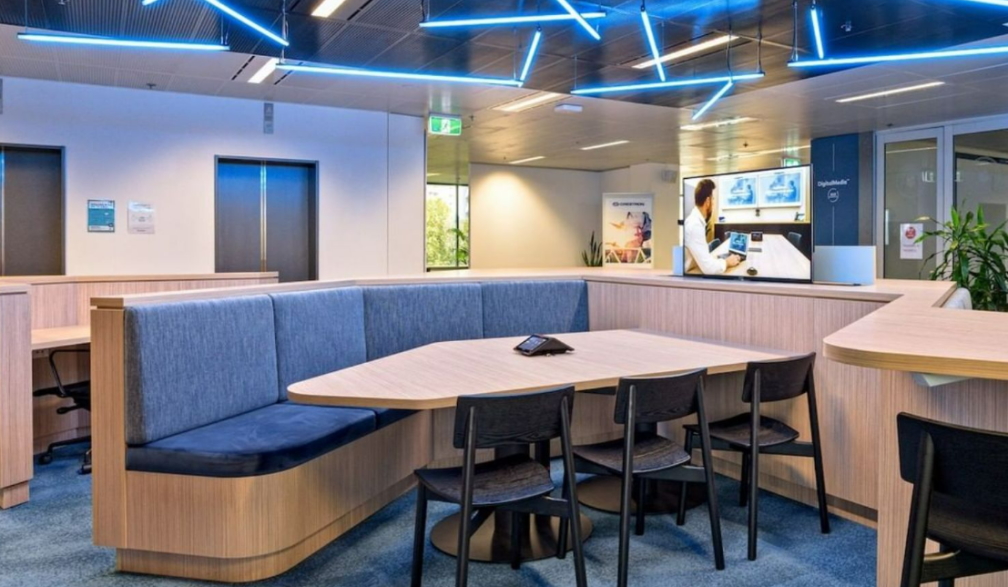Office Fitout Trends For Hybrid Workplaces

Hybrid workplaces are the biggest office design and fitout trend in 2022. COVID-19 forced a work-from-home policy for many companies but now that restrictions have been eased, many are moving forward with their plans to bring workers back to the office under a hybrid workplace policy. Many companies presently see a hybrid work model as the best compromise for keeping their workforce engaged while offering flexibility in work location without compromising on in-office collaboration.
What is a Hybrid Workplace?
The term hybrid workplace describes an office environment where the staff can work at any time across varied locations, i.e. at home, café, office, etc. Now that many employees have experienced the benefits of remote work, smart employers recognise that keeping these employees engaged requires the ‘best of both worlds’ approach that hybrid working can potentially deliver. If you want to introduce a hybrid workplace policy in your office, here are some office fit out trends for hybrid workplaces.
5 Office Fitout Trends for Hybrid Workplaces
When designing a hybrid workplace, consider the flexibility of the office space. Your people need spaces to work solo in peace, together in teams, meeting with remote colleagues, as well as shared spaces that are so crucial for spontaneous collaboration. In addition, consider the many technologies that support hybrid workplaces. These include meeting room technology like video conferencing, room occupancy sensors and employee mobile apps. This section lists the five office fitout trends for hybrid workplaces.
1) Flexible Workspaces
Flexibility is a major consideration for many office fitout companies these days, and it can help businesses attract and retain the best employees. Flexible office spaces are great for fostering collaboration and can help reduce staff turnover. In addition to attracting top talent, flexible workplaces can also reduce the costs associated with recruitment and staff retention. Formerly used by startups and freelancers, flexible workspaces have become a strategic business decision for many companies. With more people working remotely, the need for flexible workspaces has increased.
2) Open Bench-Style Stations
To reduce costs, companies are adopting hybrid workplaces that combine open bench-style stations with traditional cubicles. But to make this strategy work, it is important to get the design right. For example, the open bench-style stations should be ergonomic and offer the right amount of support. One solution is an open bench-style station with a movable table and bench. The open bench-style station can be used for work and as a communal table.
3) Hybrid Meeting Equity
The trend towards remote work and flexibility has made high quality video conferencing a necessity. A recent survey by Microsoft found that 73% of employees prefer to work from home for a couple of days per week. Hybrid meetings, with some in the office and some working remotely, are now very common. However, remote meeting participants are often disadvantaged by the technology, finding it hard to communicate on equal terms with people present in the meeting room. Hybrid Meeting Equity is a rising concern, and much new technology is focused on ensuring all participants can be seen and heard fairly.
4) Flexible Furniture
There are several benefits of flexible furniture for hybrid workplaces. First, it enables you to adapt the space to the needs of the people who use it. For example, a draughtsman-style table is perfect for you if you need to work for a long time on a particular project. The draughtsman-style table is highly adaptable and can be used by both standing and seated workers. Secondly, flexible furniture is ideal for offices that want to promote an agile and creative working environment. For example, some employees may use a sofa as their workstation, while a cafe bench may be used for face-to-face meetings and lunchtimes.
5) Design For Privacy
The hybrid workplace's evolution has changed how space is used, with a shift from the private to the shared. This means that you need to design in options for privacy when your employees need it. Examples here include small video-conference or phone rooms, giving people working in shared spaces somewhere to meet or talk without everyone being in on it. Given the greatly increased need for video meetings and phone calls with remote collaboration, these solutions should be factored in from the start.
How to Create a Hybrid Workplace?
The first step toward creating a hybrid workplace is to identify your goals (e.g. employee retention, increased productivity, reduced office space costs) and build your strategy around them. The second step is communication with your employees to build support for the idea and learn about their needs and concerns. After all, it is all about employee engagement and productivity, so you need to get this right.
The key to a successful hybrid workplace is to provide flexibility for employees without impacting the benefits of face-to-face collaboration. For example, companies can offer a hybrid workplace model that allows employees to work at home and in the office, supplemented by well-executed hybrid meetings.
The next step then is digital transformation. With today’s technology, companies can engage and unite distributed teams. The advantage of this model is that employees can work from home and still be fully engaged in the work process. They can focus on their personal and professional goals while collaborating with colleagues from anywhere in the world.
The Bottom Line
Is hybrid working the future of work? The short answer is 'Yes.' However, employees are now spoiled for choice in this regard, and if employers want to attract and retain talented staff, they'll have to create and maintain a best-practice hybrid workspace. The 5 trends in this article are a great place to start.







